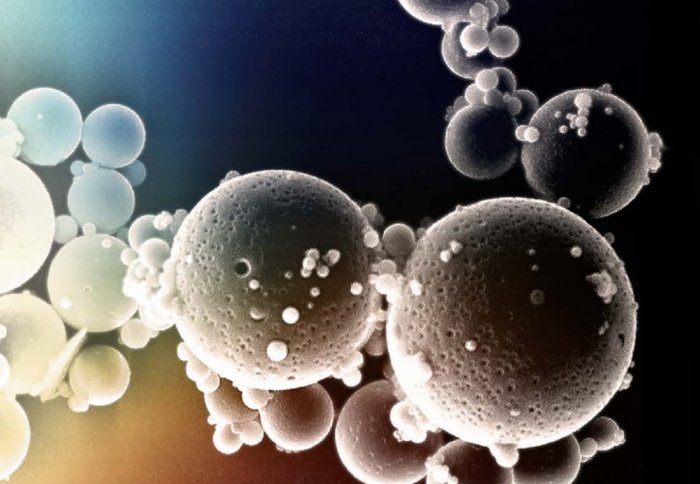4th Annual CDT Festival of Science

The winning entry to this year's CDT festival of science photo competition by Michele Tonutti titled 'Nano Worlds'
The fourth annual CDT festival of science took place on Thursday the 23rd of April.
After three months of planning and organising on the part of the CDT FoS committee the event was a great success with six engaging talks to entertain the many staff and students who attended throughout the day. This year's line up was made up of six speakers from academic and non academic backgrounds making for an interesting mix of perspectives on the topic of 'Criticism and Science'.
Professor Geraldine Thomas was the first speaker of the day discussing the topic of 'Health Risks from Radiation from Nuclear Accidents – Facts and Fantasy'. Geraldine brought some hard facts and science into the argument on the risks of nuclear energy, cutting through many of the common perceptions and misconceptions demonstrating that nuclear energy actually poses less risk to human health than alternative energy sources such as coal. Next up was Sir Professor David Spiegelhalter who's talk was titled 'Shabby statistics? Communicating uncertain evidence through the media'. David's talk kept the crowd entertained with many examples of newspaper headlines which either misrepresented or completely missed the point of the science being presented. The serious message was that as scientists we can't rely on journalists to have a clue about what our science means so we must take responsibility for communicating our research effectively with carefully written press releases.
After a full morning of intellectual pursuits it was time for lunch. Over lunch the attendees had a chance to peruse the many fantastic entries we received to the CDT FoS photo competition. Introduced this year, the photo competition was a refreshing change to providing posters. The competition highlighted in a fun and visually striking way just how much great research is conducted at Imperial.
Dr. Chris Scott gave the next talk titled 'An Example of the Challenge in Publishing Cross-Disciplinary Science'. Chris gave us a whirlwind tour of atmospheric physics and meteorology focussing on the interaction of the Sun's varying magnetic field with the Earth's weather system and how this influences lightning storms on Earth. We then heard how the peer review system can run into difficulty when research is presented in an area of science on the borders of knowledge where few have ventured as is the case in the "fundopause", a region of the Earth's atmosphere somewhat neglected by scientific research councils. Marianne Talbot then gave us all lots to think about with her discussion of the 'Benefits and Drawbacks of Peer Review'. This was clearly a subject close to the audience's hearts as Marianne stirred up some lively debate with the audience which produced some novel ideas for improving the peer review process. Next we heard from Alice Bell who took us back in time to the 70's. 'Science for the People' was an independently published magazine created by a group of passionate Imperial alumni who were determined to use their voices as scientists to champion the rights of ordinary people and effect social change. Alice's talk was inspiring, demonstrating how much people are capable of if they are well organised, passionate and determined.
With coffee and biscuits to fuel the audience going into the final session of the day we heard from Dr Simon Singh, famous for his popular science books including 'Fermat's last theorem' and 'The Simpsons and their mathematical secrets'. Simon talked passionately about his love of science and the rigorous and logical structure with which the scientific world view enables one to understand the world in his talk titled 'Good Thinking - Science v Pseudoscience'. After six great talks and with much to think about the audience had a chance to put their questions to a panel made up by Geraldine, Chris, Marianne and blogger Joe Tennant which resulted in a lively and interesting discussion. Finally a drinks reception rounded off the day where the UCell team from UCL gave an impressive live demonstration of their hydrogen fuel cell technology forcing us to question Elon Musk's derisive labelling of the technology as "fool cells".
All in all it was a great day and many thanks must go out to the speakers and those who contributed to the event as well as everyone who attended making it all worth it.
Article text (excluding photos or graphics) © Imperial College London.
Photos and graphics subject to third party copyright used with permission or © Imperial College London.
Reporter
Veena Dhulipala
Registry